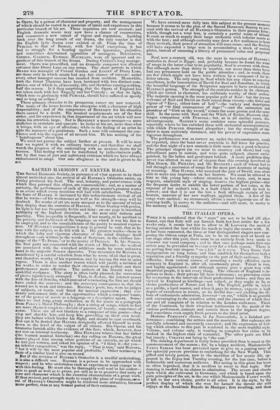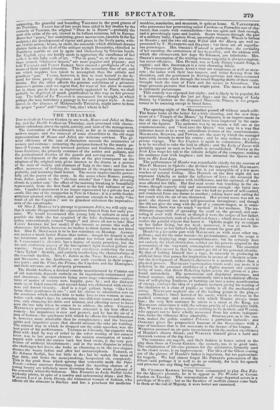THE ITALIAN OPERA.
WHEN it is considered that the " stars " are not to be had till after Easter, and that Italy will not furnish forth her best artists for a few weeks only, it seems but fair to allow to M. LAPORTE the merit of having secured the best within his reach to begin the season with. If, as has been rumoured, the three or four distinguished singers now com- posing the Odeon corps at Paris, are to be no mere seen or heard on our stage after this year, there must be an entirely fresh levy made to rhnonter our vocal company ; and in that case perhaps some first-rate artists may be prevailed on to conic over for a whole season. There is no getting first. rate singers " on a job " as it were. They frame their engagements on long terms, and thus establish for themselves both a reputation and a friendly sympathy on the part of their audience. The difficulty, from various causes, of mounting a really effective opera company in England is, after all, enormously great. Talent is rare, and highly appreciated; and although money goes a great way with theatrical people, it is not every thing. The climate of England is in- jurious to them ; their private life here is tiresome; no provision exists fbr recreation in the intervals of their professional duties ; and they are viewed in England as hirelings—not valued, as they ought to he, as choice productions of Nature and Art. The English public is, taken as a public, a hard master, and when it pays its money, expects a high degree of excellence in return, as its lawful due—not yielding the tri- bute of enthusiastic admiration, however " en sus," which is so grateful and encouraging to the sensitive artist, and the absence of which they one and all complain of in relation to the London audiences. Those of the Continent, by their vivacious testimonies to the merit of the various performers, animate and sustain them in the highest degree, and sometimes even supply fresh powers to the tired artist. Madame PERSIANI'S Athina, in La Sunnambula, is a finished per- formance ; combining the actress and the musician. Her cadenzas are carefully schemed and accurately executed ; and the expression of feel- ing which attaches to this part is rendered in the most truthful style. Volume, and volume only, is wanting to complete her claim to be ranked in the highest class of cantatrici. The other parts arc filled but tamely ; COLETTI not being in "the cast." The dancing department is really better provided than is usual at the commencement of the season ; for, by a happy accident, Mademoiselle FANNY ELSLER has been prevailed upon to give us a passing taste of her splendid powers previous to embarking for the New World. This gifted and lovely person, now in the meridian of her scenic life, ap- peared in the Gipsy last Tuesday evening, for the last time, before a fashionable and numerous audience. Iles acting in this piece has been so often bepraised, that it is needless to recur to that topic. Her
dancing is twofold in its claims to admiration. The severe and classic
style which she cultivated in Germany, and which is based upon the pure principles of the art, is the one which Mademoiselle FANNY would,
if left to her own choice, prefer to all other. It is the style, by the perfect display of which she won for herself the throne she still enjoys at the Academie Royale de Musique ; first rivalling, and then sss
ina the graceful and bounding TAGLIONI in the good graces of
surfs -•
the Parisians. FANNY has of late years been aided in her studies by the counsels of VEsTais, the original " Dieu de la Danse"—probably the i most able critic of the art, viewed in its loftiest relations, left in Europe. }levee her " poses," her undulating, grave movements, (models fit for the sculptor,) the development of vigour and grace in the lively parts, with- out violent action : hence, in short, the ensemble which dilettanti dreams shadow forth its the ideal of the antique nymph Danzatrice, chiselled in rcutilicon marble or cut in agate and chalcedony by Grecian hands. But. English eyes arc hardly made to appreciate the excellence of her niNede in this lofty walk of art. "Pas de gour," or, as they are some- times termed, "character dances," are more popular and piquant ; and both TscLiost and FANNY ELSLER have created a prodigious eMet by means of their varied attraction. This is the secondary line of art, and one whieh requires less talent to accomplish than the artistic and grandiose " pas." FANNY, however, is fain to lend herself to the de- mand for these pretty disguises ; and in fact acquits herself divinely therein. But the other aftbrds the genuine exhibition of a premiere dauseuse's genius ; and we regret that, for want of her sister to sustain her in those pus de deux so rapturously applauded in Paris, we shall probably be deprived of much gratification in this way on her present visit. The ballet of La Tart:nide is announced for to-night, in which perhaps she may introduce a passage in her own proper style. A male dancer. in the absence of Mademoiselle TnWsn, might serve to form the proper "poses" and " tours ;" but, alas 1 where is he?



























 Previous page
Previous page